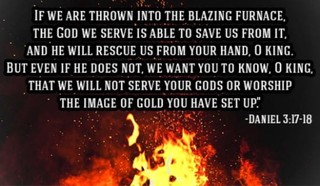- Recent Translations
- All Translations
Daniel 3:5
Share
Settings
Daniel 3:5 Meaning and Commentary
That at what time ye hear the sound of the cornet
So called of the horn of which it was made; a sort of trumpet; so the Jews had trumpets of rams' horns: flute;
or pipe, or whistle, so called for its hissing noise; it is used of the shepherd's pipe or whistle; see ( Zechariah 10:8 ) , harp;
an instrument of music used by David, and much in use among the Jews, and other nations; sackbut;
or "sambuca"; which, according to Athenaeus F7, was a four stringed instrument, an invention of the Syrians; and Strabo F8, a Greek writer, speaks of it as a barbarous name, as the eastern ones were reckoned by the Grecians: psaltery;
this seems to be a Greek word, as does the next that follows, rendered "dulcimer"; but in the original text is "symphonia"; which does not signify symphony, or a concert or consort of music, but a particular instrument of music. Maimonides F9 makes mention of it as a musical instrument, among others; Servius F11 calls it an oblique pipe; and Isidore F12 describes it a hollow piece of wood, with leather stretched upon it, and beat upon with rods or sticks, something like our drum: the king of Babylon might have Grecian musicians, or, however, Grecian instruments of music, in his court, as the Grecians had from the eastern nations: and all kinds of music;
that could be had or thought of; and this was done in honour to this idol, and to allure carnal sensual persons to the worship of it, according to the order given: ye fall down and worship the golden image that Nebuchadnezzar the king
hath set up;
when they heard the music sound, immediately they were to repair to the plain where the image stood, and pay their adoration to it; or to fall down prostrate in their own houses in honour of it; and perhaps persons were appointed in all cities and towns throughout the empire to play this music; at hearing which, all people, nations, and tongues, were to bow down, in token of their religious regard unto it.
F7 Deipnosoph. I. 4.
F8 Geograph. l. 10. p. 324.
F9 Hilchot Celim, c. 10. sect. 14.
F11 In Virgil. Aeneid. I. 11.
F12 Originum, l. 3. c. 21.
